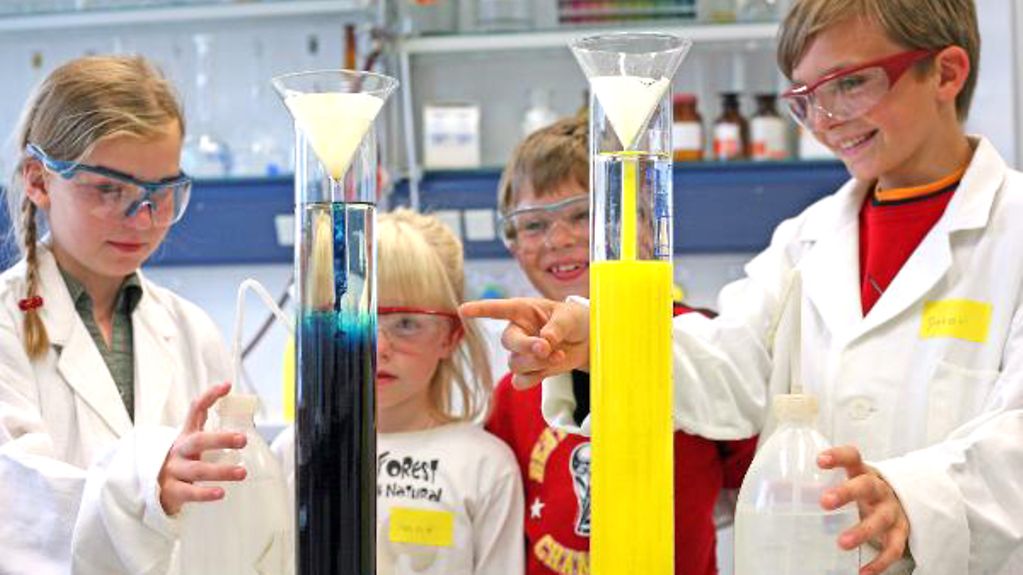Action plan presented
The aim is to raise enthusiasm for what are termed the MINT subjects. The MINT action plan (mathematics, IT, science, technology – the German equivalent of STEM) has now been unveiled by Federal Education Minister Anja Karliczek. A sum of 55 million euros has been earmarked for investment in education in MINT subjects between now and 2022.
3 min reading time

The MINT action plan aims to encourage more children and young people to get involved in scientific experiments.
Photo: picture-alliance/ ZB
"Naomi" has no reservations about technology. The female robot welcomes the Federal Education Minister to the school laboratory "dEin" at Berlin’s Technical University with a cheery "Hello, Frau Karliczek, how are you?" Anja Karliczek smiles happily. If "Naomi" were a young woman she would be a perfect example of the success of the renewed efforts to promote MINT subjects.
Although children and young people can experiment to their heart’s content at places like this Berlin laboratory designed specifically for schoolchildren, enthusiasm for the MINT subjects is often limited. Many children are curious and enjoy experimenting. "By the time they reach 14, however, many young people have lost this curiosity," reports the Federal Education Minister. And this is not only true of girls.
Young people are the main target group
That is reason enough for the MINT action plan, which addresses young people in particular. According to Anja Karliczek, it is particularly important that more young people become interested in technical and scientific subjects. For instance, we can only understand how internet search engines make their suggestions or evaluate the development of new ideas and business models if we understand what an algorithm is.
"A good education in MINT subjects offers many opportunities for individuals and for Germany," stressed the Minister.
Four priorities of the action plan
The action plan steps up the German government’s measures and engagement in four areas with the following goals:
- Promoting MINT education for children and young people
- Countering the shortfall of skilled workers in MINT professions
- Increasing the opportunities open to girls and women in MINT professions
- Demonstrating to society the great importance of MINT.
"Every young person should be able to select a profession in line with his or her talents. To do that, young people must be able to genuinely explore their aptitudes and preferences while they are young," declares the Minister with conviction.
Competition to raise interest
That is why there is a focus on the 10 to 16 age group. This is the group the Federal Education Ministry aims to target with regular offers, recurrent events and special support in the field of MINT education. Specifically, a competition is to be held nationwide to promote 30 to 40 clusters within which regional MINT players get together and implement long-term initiatives.
Computer games for girls
One example of the way the plan addresses young women undertaking vocational training is the SERENA project and, based on it, MitEffekt. These are known as serious games. The computer game, which targets girls aged between 12 and 16, sets the player extremely realistic tasks and puzzles in the field of renewable energy. Users can test, as they play, how much technical knowledge they already have, that they could use later in their profession.
Platform helps networking
Another key part of the action plan is an online-assisted nationwide MINT platform. The aim is to better network private and state activities. The platform is also to become a virtual marketplace and roll out good MINT practice.
Moreover, the action plan intends to better publicise all activities relating to the promotion of MINT subjects. The communication concept devised aims to see MINT perceived as something positive and part of everyday life.
The Federal Education Minister is also promoting research into successful qualitative MINT education, and identifying measures that build a lasting interest in MINT.
The acronym MINT is made up of the first letters of the German terms for mathematics (Mathematik), IT (Informatik), science (Naturwissenschaften) and technology (Technik). It is roughly equivalent to STEM (science, technology, engineering, technology). The term MINT is used as an umbrella term in Germany to cover school instruction, university degrees and occupations in these four areas.